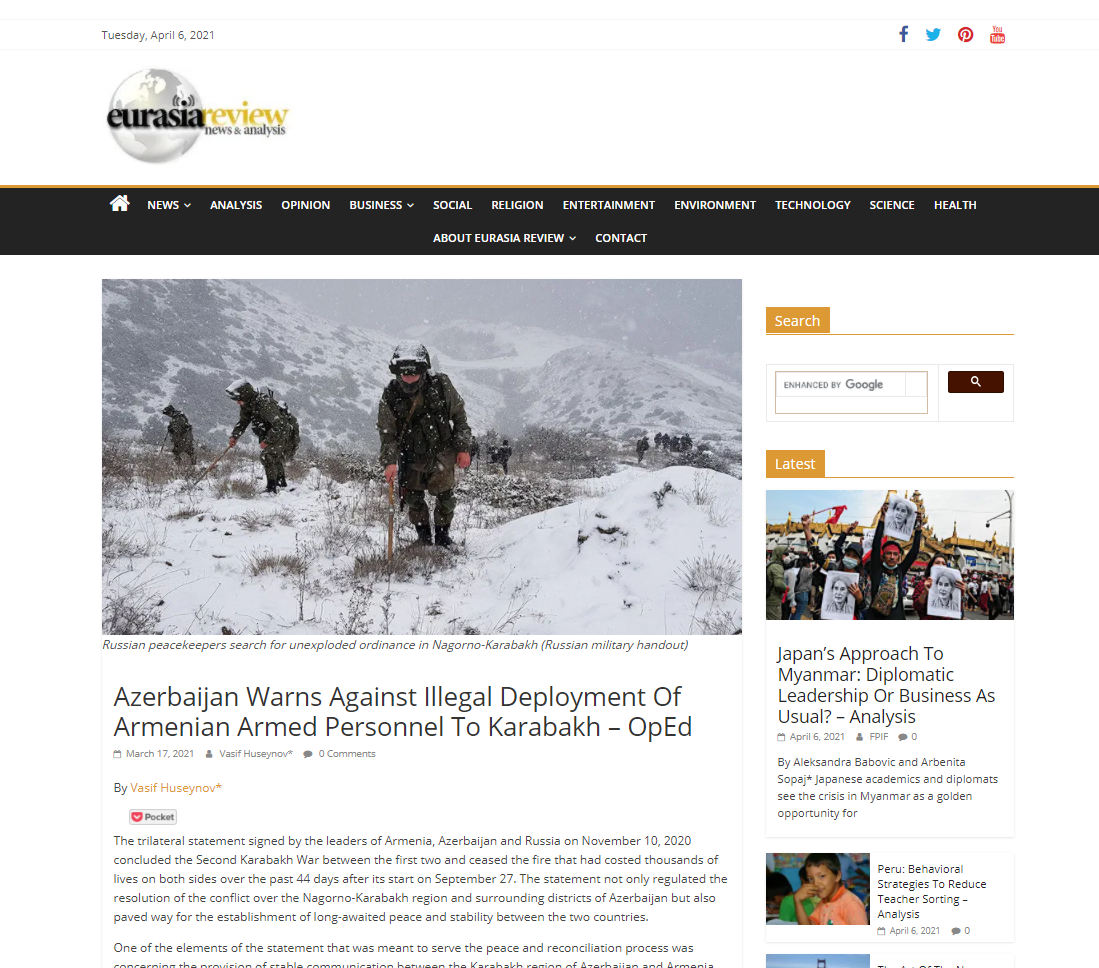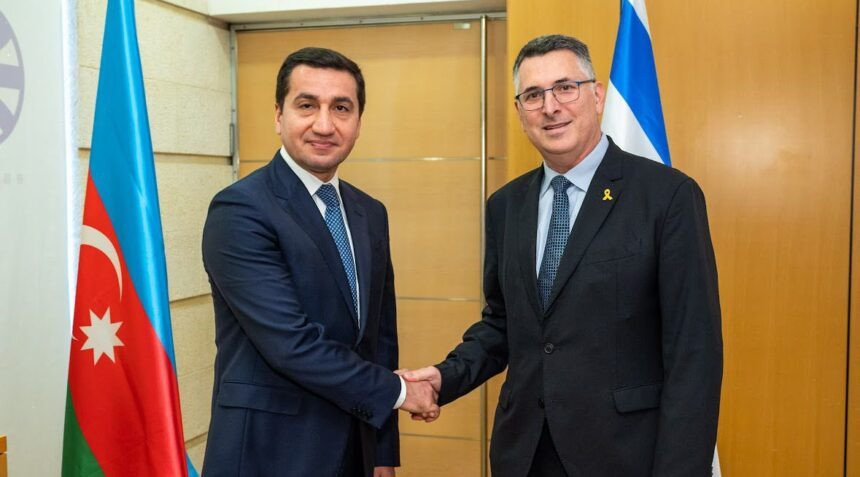On March 14, President Ilham Aliyev of Azerbaijan received the delegation of the Organization for Security and Cooperation in Europe (OSCE), led by this year’s OSCE chairperson-in-office, Swedish Foreign Minister Ann Linde. During their meeting, Aliyev reiterated his positive assessment of the post-war situation in relations between Armenia and Azerbaijan stating, “We think [the] four months [that] passed after [the second Karabakh] war already demonstrate the will of both sides to turn the page [of enmity] and to concentrate on the future” (President.az, March 14). Moreover, he reaffirmed his support for the launch of transportation and communication channels between Armenia and Azerbaijan, as agreed in the trilateral (Azerbaijani-Armenian-Russian) ceasefire statement of November 9, 2020, adding that this can serve as a “starting point” for opening a new chapter in relations between the two sides, finally “leaving the conflict to history.” And two days later, on March 16, broadly seen as a gesture of goodwill toward Yerevan, Baku agreed to temporarily allow Russian natural gas deliveries to Armenia to transit Azerbaijani territory (Turan, March 17).
Despite these optimistic messages, President Aliyev and other representatives of the Azerbaijani government continue to repeatedly raise concerns about the threats to the precarious balance established by last autumn’s trilateral accord and to subsequent peace initiatives (President.az, February 26). Among Baku’s main apprehensions are the deployment of Armenian military personnel to the Karabakh region via the “Lachin Corridor,” the Russia-supported modernization of the Armenian army, and Yerevan’s unwillingness to fully comply with the agreement regarding the opening of transportation and communication channels.
The transfer of Armenian forces to the Karabakh region is seen as a particularly formidable threat by the Azerbaijani authorities, as this poses multiple challenges to Baku’s security policies. First, these deployments are at odds with the fourth article of the trilateral statement, which commits Armenia to withdraw its military units from the region concurrently with the deployment of Russian peacekeepers (President.az, November 10, 2020). Second, the introduction of additional Armenian military personnel, coupled with Yerevan’s refusal to acknowledge the results of the war, undermines efforts to establish a durable peace, especially in a region currently under the control of a Russian peacekeeping contingent. Third, the eastward transit of Armenian troops into Karabakh breaches the agreement between the sides concerning the use of the “Lachin Corridor” only for humanitarian purposes, which is supposed to be supervised by the peacekeepers as they control all movement through the corridor (Azertag.az, March 12). This all creates an insecure situation that might spiral out of control and risk new armed confrontations in the future.
In his letter addressed to the secretary general of the United Nations on March 1, 2021, Azerbaijan’s Foreign Minister Jeyhun Bayramov warned against this threat declaring, “According to the credible information available to the Azerbaijani side, which is also validated by the reports of independent mass media sources, members of [the] Armed Forces of Armenia, wearing civilian dress, are transferred to the territory of Azerbaijan through the ‘Lachin Corridor’ in civilian trucks, including disguised among the construction cargo, in an attempt to escape the control procedures of the Russian peacekeeping contingent” (Azertag.az, March 12).
Azerbaijan asserts that Russia, as the principal guarantor of the ceasefire established by the trilateral accord, bears the responsibility to counter the attempts to violate the November 9 agreement. This is likely why President Aliyev, in his four-hour-long press conference with the representatives of local and foreign media on February 26, responding to a question about the possibility of the rejection of this accord by Armenia in the future, reminded that “there is a signature of the President of Russia on the document, and he [Vladimir Putin] acts as the guarantor of this document” (President.az, February 26). Aliyev reiterated Putin’s warning against attempts to back out of the ceasefire deal and the Kremlin leader’s identification of this possibility as “suicidal” for Armenia.
Azerbaijan is also cautious about Russia’s involvement in the modernization of the Armenian military. Calling on Russia to recover the Iskandar ballistic missiles from Armenia, Aliyev stressed that Moscow’s original provision of these missiles to Yerevan “does not serve to stability in the South Caucasus” (President.az, February 26). He also rebuked the ongoing plans to upgrade the Armenian army, supported by Moscow. “The Russian side says that it is ready to modernize the Armenian Armed Forces. […] But if we are talking about lasting peace, is it worth doing it?” he asked rhetorically.
On March 5, addressing the seventh assembly of the ruling New Azerbaijan Party (YAP), President Aliyev, who is simultaneously the party chairperson, for the first time talked about another threat to the full implementation of the trilateral accord. “Armenia refuses to cooperate [in the opening of regional transportation and communication links]. Now they want to hinder the building of the Zangazur corridor,” referring to the ninth clause of the November statement about the opening of a land connection between Azerbaijan proper and Nakhchivan Autonomous Republic across southern Armenia (President.az, March 5). He assured that Yerevan will not be able to prevent this.
These threats and challenges to the post-war peace process are exacerbated by the Armenian side’s refusal to characterize the Karabakh conflict as “resolved” (see EDM, March 9). The domestic political instability in Armenia and the pressure posed by more hardline political and military forces to the government of Prime Minister Nikol Pashinyan further strain tensions between Yerevan and Baku, necessitating vigilance and intervention on the part of the international community against destructive trends in the region (EurasiaNet, March 1). However, as the last three decades tragically demonstrated, the only way to achieve enduring peace is for all sides of the conflict to accept new security architecture based on the principle of territorial integrity and mutual respect for international borders—on the basis of which, minority rights can then be developed.








